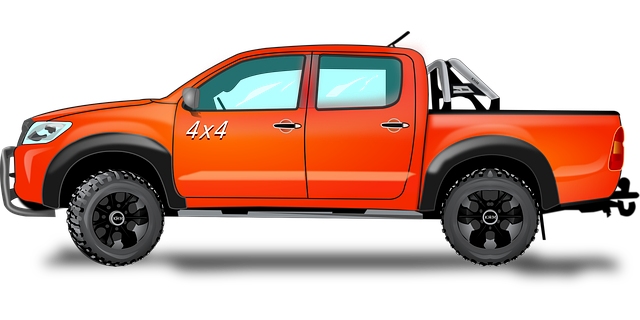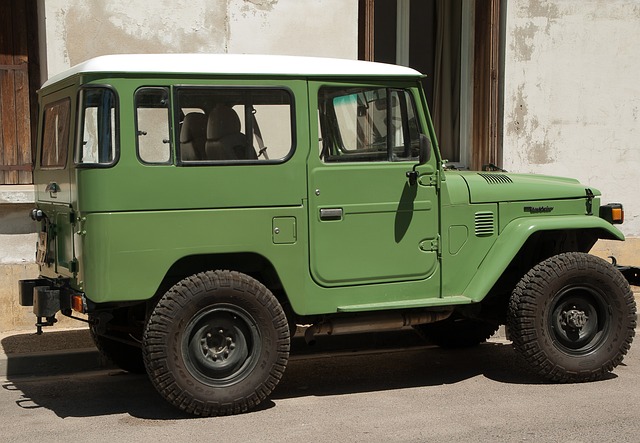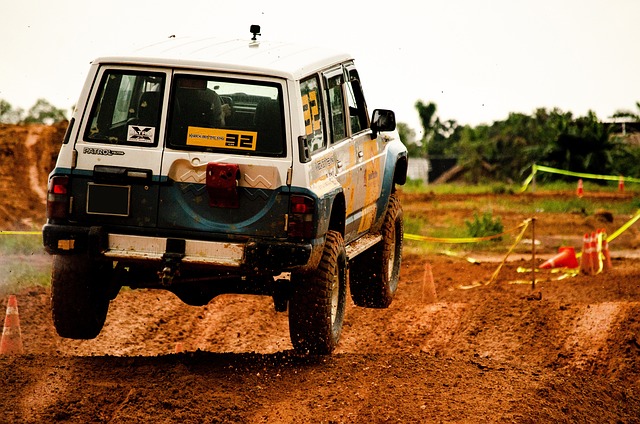Tow hooks, vital components for four-wheel drive vehicles, enhance towing and hauling. Available at McAllen's top parts stores, they come in various types (Class I, II, III) and sizes to suit diverse towing needs. When buying, ensure compatibility with your vehicle. Regular maintenance, including inspection and lubrication, keeps tow hooks in top condition. Upgrading with LED lights improves safety. For safe towing, follow pre-trip checks and practice handling trailers.
Need reliable tow hooks for your four-wheel drive? Look no further than Four Wheel Parts McAllen. This comprehensive guide unravels everything you need to know about tow hooks: from understanding their basic function and exploring different types (Class I, II, III) to choosing the perfect match for your vehicle model. Learn essential installation tips, safe towing practices, maintenance routines, and potential upgrades like LED lights. Equip yourself with the knowledge to enhance your off-road experience with Four Wheel Parts McAllen.
- What are Tow Hooks? – Define tow hooks and their basic function in four-wheel drive vehicles.
- Types of Tow Hooks – Describe different types (e.g., class I, II, III) and their unique features, including weight capacity and mounting style.
- Choosing the Right Tow Hook for Your Vehicle – Offer guidance on selecting a tow hook compatible with specific four-wheel drive models from Four Wheel Parts McAllen.
- Installation and Safety Tips – Provide step-by-step instructions for installing tow hooks, emphasizing safety measures like proper securing techniques and vehicle load distribution.
- Best Practices for Towing – Share tips on safe towing practices, including pre-trip checks, maintaining control, and handling different types of trailers.
- Maintenance and Upgrades – Discuss regular maintenance routines for tow hooks and potential upgrades to enhance performance or add features like LED lights.
What are Tow Hooks? – Define tow hooks and their basic function in four-wheel drive vehicles.

Tow hooks are essential four-wheel drive vehicle components designed to facilitate towing and hauling. These robust hooks are securely attached to a vehicle’s frame or chassis, providing a means to connect and tow trailers, trucks, or other heavy equipment. Their primary function is to distribute the load evenly across the towing vehicle, ensuring stability and safety during transport. With various types available, including chain and strap attachments, tow hooks come in different sizes and styles to accommodate diverse towing needs, catering to both everyday and off-road adventures. When selecting four-wheel parts in McAllen, consider the specific requirements of your vehicle for reliable and efficient towing capabilities.
Types of Tow Hooks – Describe different types (e.g., class I, II, III) and their unique features, including weight capacity and mounting style.

Tow hooks come in various types, each designed for specific towing needs and vehicle capacities. The three primary classes—Class I, II, and III—offer distinct features catering to different weight capacities and mounting styles.
Class I tow hooks are the most common type, featuring a high-strength design capable of handling lighter vehicles, typically up to 5,000 pounds (2,300 kg). They often use a vertical mount and are ideal for everyday towing tasks. Class II hooks, on the other hand, support higher weights, usually ranging from 5,001 to 10,000 pounds (2,300 to 4,500 kg), and often employ a horizontal mounting style for easier installation. These hooks are suitable for towing small trailers or boats. Class III tow hooks are designed for heavy-duty applications, capable of securing vehicles exceeding 10,000 pounds (4,500 kg). They usually have a drop-down design for added stability and security when towing large SUVs or light trucks. When choosing the right tow hook, consider your vehicle’s capacity and the type of load you intend to tow—a vital step in ensuring safe and reliable towing.
Choosing the Right Tow Hook for Your Vehicle – Offer guidance on selecting a tow hook compatible with specific four-wheel drive models from Four Wheel Parts McAllen.

When selecting a tow hook for your four-wheel drive vehicle from Four Wheel Parts McAllen, compatibility is key. Make sure to choose a hook designed specifically for your make and model to ensure a secure fit. Four Wheel Parts McAllen offers a wide range of options tailored to various off-road vehicles, ensuring you find the perfect match for your needs.
Consulting their expert staff can provide invaluable guidance on which tow hook will best suit your towing requirements. Consider factors like the vehicle’s weight capacity and the type of towing you plan to do—hauling a trailer, carrying heavy equipment, or simply needing a backup recovery solution. With the right choice, you’ll enjoy peace of mind knowing your vehicle is ready for any adventurous journey ahead.
Installation and Safety Tips – Provide step-by-step instructions for installing tow hooks, emphasizing safety measures like proper securing techniques and vehicle load distribution.

When installing tow hooks, safety should always be your top priority. Start by ensuring your vehicle is securely parked on a level surface and apply the parking brake. Next, locate the towing points on your vehicle, typically near the front or rear bumper, and identify the corresponding holes in the tow hook assembly. Line up the hooks with these points and gently insert them until they are firmly in place. Once installed, it’s crucial to secure the tow hooks properly using the provided bolts or fasteners, tightening them according to the manufacturer’s recommendations.
Proper load distribution is equally important. Always use a well-designed towing setup that maintains even weight across your vehicle and trailer. Check that all connections are secure and that your vehicle’s weight capacity matches the load you’re carrying. Regularly inspect your tow hooks and associated hardware for any signs of wear or damage, replacing them as needed. For four wheel parts McAllen customers can rely on, ensure they come from reputable sources and meet industry standards to guarantee safety during towing operations.
Best Practices for Towing – Share tips on safe towing practices, including pre-trip checks, maintaining control, and handling different types of trailers.

Before hitting the road with a trailer in tow, four wheel parts McAllen experts recommend conducting thorough pre-trip checks. This includes ensuring your vehicle’s hitch is properly secured and that all lights and electrical connections are functioning correctly. Always double-check tire pressure, brake systems, and fluid levels before setting off.
Maintaining control during towing is paramount. Reduce speed when towing, leave ample space between you and other vehicles, and anticipate slower stops. Be aware of trailer sway, which can occur due to wind or abrupt maneuvers, and learn techniques to mitigate it. Practice handling different types of trailers, whether a small utility trailer or a larger travel trailer, in controlled environments before venturing onto busy highways. Safe towing is a skill that requires practice and preparation, so always prioritize safety first.
Maintenance and Upgrades – Discuss regular maintenance routines for tow hooks and potential upgrades to enhance performance or add features like LED lights.

Regular maintenance is key to keeping tow hooks in top condition. At four wheel parts McAllen, we recommend inspecting them for any signs of wear or damage, and lubricating moving parts to ensure smooth operation. Over time, components like pins, springs, and eyelets may need replacement to maintain optimal performance. Upgrading your tow hooks with LED lights can significantly enhance visibility during towing operations, making it safer for both you and other drivers on the road. These bright lights can be added as part of a routine upgrade or repair, improving overall functionality and safety features.
When selecting and installing tow hooks for your four-wheel drive vehicle from Four Wheel Parts McAllen, remember to prioritize safety, match the hook’s weight capacity to your towing needs, and follow proper maintenance routines. By adhering to these best practices, you’ll enhance your towing experience and ensure a secure connection for any trailer you hitch up.



